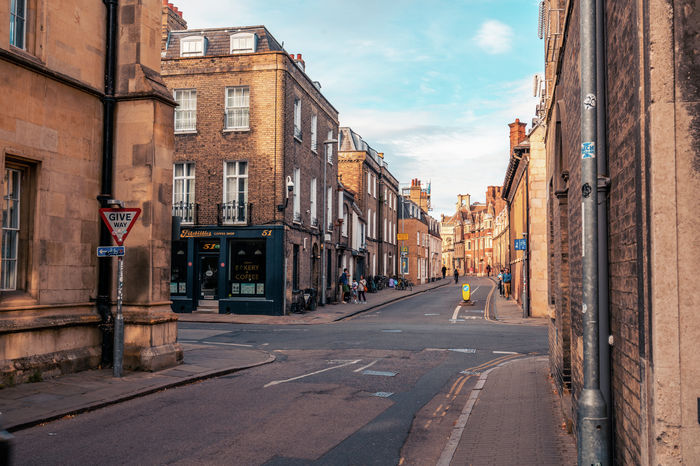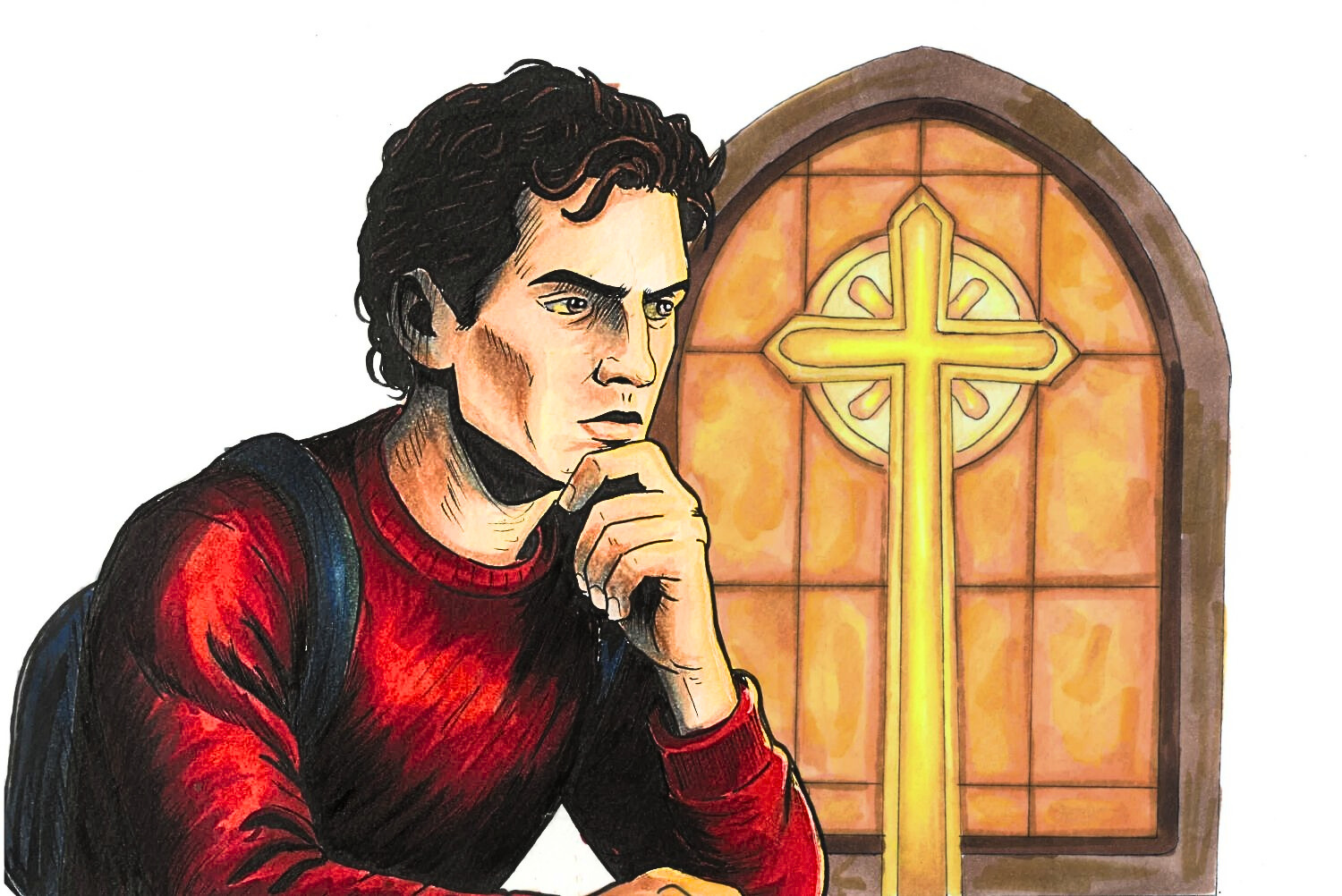“What, on Earth, is God doing?” The pastor’s pun elicits a few chuckles from the packed church. It’s the Tuesday of Fresher’s Week at Holy Trinity Church’s weekly student night, and about eighty undergraduates have come to listen to the address. Fresher’s Week has always been a time of uncertainty and anxiety, and the pastor offers a simple, timeless solution: “God, through Jesus, is always with you […] He is a companion to you, and so is this space.”
This message has seemed to resonate with a growing number of young people. A report published by the Bible Society earlier this year suggests that churchgoing amongst 18-24 year olds has jumped from 4% in 2018 to 16% in 2024, a phenomenon that several major news outlets have termed the “quiet revival”.
“Everytime I went to a service I’d feel something that I didn’t feel anywhere else,” confessed Erika, who is studying for an Mphil in theology. Erika’s conversion from a “very convicted Dawkins-esque atheist raised in a mostly atheist household” began here at Cambridge, while studying for an undergraduate degree in Theology. Dragged along to church by a friend in Fresher’s week, she found herself coming back to church services, while “intellectually engaging with the (Christian) ideas on a deeper level” through her degree. After a year, she had decided that “this is like a really convincing way to live your life.”
“Every time I went to a service I’d feel something that I didn’t feel anywhere else”
Many religious students recount similar experiences of choosing their faith, and choosing it late. Elijah, a second year English student at Jesus college, said, “I grew up in a Christian family, so all my life, I’ve been going to church, but it was probably just over two years ago that I really took my family’s faith for myself.”
Elijah believes increasing numbers of students are making the same choice. “I’ve spoken to so many people at uni who like, a year ago or so, just felt like ‘I really need to read the Bible’ […] and became Christians.” He claimed that his church, Holy Trinity Church, just recently bought a new building to accommodate the increasing numbers of the faithful and the curious. “People are, every Sunday, just walking in off the street saying ‘what´s going on here? I want to be a part of it’ and sticking around.”
Sat in a quiet office next to a court that used to be a cloister, the Reverend Dr Crockford, Dean of Jesus College Chapel, told a similar story of a curiosity-fuelled engagement with the faith. Because “many students haven’t experienced religion before,” he believes they approach it with a “new sense of curiosity and readiness to explore something that’s unfamiliar and beguiling and wonderful and strange in the way that a lot of things are at Cambridge.”
“Your pub and your post office are gone, but hopefully you might have your church left”
Father Keane, the Catholic Chaplain to the University, echoed this sentiment. Noting that the Catholic Chaplaincy of Cambridge, Fisher House, also seems to have more students “who are at least exploring Christianity” he argued that “this is because university creates a new space for thinking and exploring.”
Freed from the baggage of previous generations, religion seems to have become, for some, an object of genuine curiosity and a viable solution to problems both simple and existential. For Rev’d Crockford, the college chapel offers students, among other things, a respite from the pressures of Cambridge: “It’s one of the opportunities to put your phone away and be uncontactable […] and it’s where your brain learns to disengage and be able to think bigger things.”
He addressed the broader role played by faith within an increasingly atomised society. At a time where public spaces are disappearing, with the number of local youth centres having fallen by 53% between 2011–12 and 2022–23, as reported by the National Youth Agency, religion and its institutions are “shouldering a lot of the work of keeping a community together.”
“The sense of buzz and thrill and belonging was incredibly special.”
Finding clear words for the current situation, he painted a bittersweet picture: “your pub and your post office are gone, but hopefully you might have your church left.”
In a college context, the Rev’d Crockford recognised the appeal held by chapels as communal places for many students irresepective of their faith, or lack thereof. “We noticed that this is what makes what we do make sense. We’re there to foster that community and belonging, which comes with a pastoral care, sometimes a very gentle one.”
As we neared the end of our conversation, he described the first drinks reception following evensong held after after months of Covid lockdown. “It was a summer, I can remember it very vividly. You had to book to attend the evensong, and wear your face mask and you couldn’t sit near everyone else. But we were finally allowed to be in groups of six outside drinking a glass of wine. And the sense of buzz and thrill and belonging was incredibly special.”
For Elijah, belief in God provided him with a “sense of identity grounded in Him and a community”. Pointing to the feelings of loneliness and anxiety felt by many young people, he sees the “revival” as “almost a response to the mental health crisis we’re having.”
“People in other ministries are seeing, whether it’s related to the rise in Christian nationalism on the streets that we’ve seen lately, an interest from young men in reengaging and rooting themselves in particular expressions of Christianity.”
“Not in that Christianity solves this, but people have been feeling anxious and depressed, and then are coming to church, and feeling so much better because as we’ve learned more about who God is we’ve learned more who we are.”
Nitha, a second year Law student at Jesus College, explained how embracing her family´s Catholic faith as a teenager gave her “an integral support system in her life”. She continued by pointing to general trends in politics and economics as a central explanation for the turn to religion by young people: “I think politics and the economic stability of a country definitely contributes to what the religious spectrum looks like.”
The perceived increase in youth religiosity has also given rise to concerns that this spectrum may be increasingly dominated by nationalist and far-right forces. Nitha revealed how several young boys in her highschool, “as they radicalised politically and became more rightwing at the same time also became Christian […] because there is that traditional aspect to it that appeals to them”.
In the same vein, the Rev’d Crockford noted how “people in other ministries are seeing, whether it’s related to the rise in Christian nationalism on the streets that we’ve seen lately, an interest from young men in reengaging and rooting themselves in particular expressions of Christianity.”
“One of the gifts of college chapels is that our job is to be a deliberately open and inclusive stance of Christian faith”
Expressing his concern about the “misappropriation of Christian imagery and purported identity in the recent few months” he believes college chapels have a role to play in countering this trend: “One of the gifts of college chapels is that our job is to be a deliberately open and inclusive stance of Christian faith. Sometimes that involves dismantling the alternative narratives of what the Chrsitian faith involves. You can’t avoid politics in religion.”
Curiosity, community and respite are the key drivers, yet Rev’d Crockford wondered “does this always cash up into signed up committed Christian faith?”
Callum Brown, Emeritus Professor for History at Glasgow University and a specialist in the history of Christianity, did not think so. Calling for “caution in the statistical analysis of religious trends”, he refered to the “slow-burn return to post-Covid normalcy” as the explanation for recent figures. Claiming that “church going remains substantially lower than it was in 2019” his conclusion is definite: There is “no reversal of the secularisation trend that has been embedded in UK society since the 1960s”.

At the crossroads: finding your own faith
Yet a revival in religious curiosity and engagement seems to be a phenomenon felt at a University where religions continues to flourish. Christian groups exist alongside over a hundred other religious organisations, as students continue to seek answers to the central questions of our time.
Finishing the service at Holy Trinity, the pastor skips to the end of the Gospel of Matthew, beyond the resurrection. There, Jesus says, “And surely I am with you always, to the very end of the age.” Perhaps that’s the quiet part of revival – people looking for a guide in uncertain times, recognising that faith can be part of the answer, and finding it right where it always has been.

